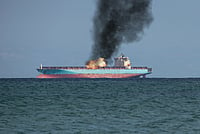The outcastes’ colony was a group of mud-walled houses that clustered together in two rows, under the shadow both of the town and the cantonment, but outside their boundaries and separate, from them. There lived the scavengers, the leather-workers, the washermen, the barbers, the water-carriers, the grass-cutters and other outcastes from Hindu society. A brook ran near the lane, once with crystal-clear water, now soiled by the dirt and filth of the public latrines situated about it, the odour of the hides and skins of dead carcases left to dry on its banks, the dung of donkeys, sheep, horses, cows and buffaloes heaped up to be made into fuel cakes, and the biting, choking, pungent fumes that oozed from its sides. The absence of a drainage system had, through the rains of various seasons, made of the quarter a marsh which gave out the most offensive stink. And altogether the ramparts of human and animal refuse that lay on the outskirts of this little colony, and the ugliness, the squalor and the misery which lay within it, made it an ‘uncongenial’ place to live in.

At least so thought Bakha, a young man of eighteen, strong and able-bodied, the son of Lakha, the Jemadar of all the sweepers in the town and the cantonment, and officially in charge of the three rows of public latrines which lined the extremest end of the colony, by the brookside. But then he had been working in the barracks of a British regiment for some years on a sort of probation with a remote uncle and had been caught by the glamour of the ‘white man’s’ life. The Tommies had treated him as a human being and he had learnt to think of himself as superior to his fellow-outcastes. Otherwise, the rest of the outcastes, with the possible exception of Chota, the leather-worker’s son, who oiled his hair profusely, and parted it like the Englishmen on one side, wore a pair of shorts at hockey and smoked cigarettes like them, and of Ram Charan, the washerman’s son who aped Chota and Bakha in turn, were content with their lot.
Bakha thought of the uncongeniality of his home as he lay half awake in the morning of an autumn day, covered by a wornout, greasy blanket, on a faded blue carpet which was spread on the floor in a corner of the twelve feet by five, dank, dingy, one-roomed mud-house. His sister slept on a cot next to him and his father and brother snored from under a patched, ochre-coloured quilt, on a broken string bed, further up. The nights had been cold, as they always are in the town of Bulashah, as cold as the days are hot. And though, both during winter and summer, he slept with his day clothes on, the sharp, bitter wind that blew from the brook at dawn had penetrated to his skin, past the inadequate blanket, through the regulation overcoat, breeches, puttees and ammunition boots of the military uniform that clothed him.
(Excerpted with permission from Penguin Random House India)


























